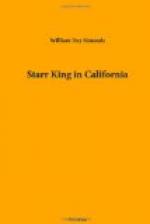Hostile criticism, which no man wholly escapes, enjoyed suggesting that King had been educated in the common schools of Portsmouth and Charlestown, and that he had graduated from the navy yard into the pulpit. A Boston correspondent passed judgment upon him as follows: “He was not considered profoundly learned; he was not regarded as a remarkable orator; he was not a great writer; nor can his unrivalled popularity be ascribed to his fascinating social or intellectual gifts. It was the hidden interior man of the heart that gave him his real power and skill to control the wills and to move the hearts, and to win the unbounded confidence and affection of his fellow-beings.”
William Everett is authority for the statement that in those early years in Hollis Street Church “Starr King was not thought to be what a teacher of Boston Unitarianism ought to be. He was regarded rather as a florid platform speaker, one interested in the crude and restless attempts at reform which sober men distrusted.” Another reviewer mingles praise and criticism quite ingeniously. “He astonishes and charms his hearers by a rare mastery over sentences. He is a skilful word-marshal. Hence his popularity as a lyceum lecturer. However much of elegant leisure the more solid and instructive lecturers may have, Mr. King is always wanted. He is, in some respects, the most popular writer and preacher of the two denominations which he equally represents, being a sort of soft ligament between the Chang of Universalism and the Eng of Unitarianism.”
This last criticism invites us to notice — all too briefly — a phase of King’s experience in New England fitting him most admirably for the larger work he was to do on the Pacific Coast. From 1840 to 1860 the Lyceum flourished in the United States as never before or since. Large numbers of lecture courses, extending even to the small cities and towns, were liberally patronized and generously supported. In many communities this was the one diversion and the one extravagance. To fill the new demand an extraordinary group of public speakers appeared; Emerson, Edward Everett, Wendell Phillips, Dr. Chapin, Oliver Wendell Holmes, George William Curtis, Henry Ward Beecher, Frederick Douglas, Theodore Parker and others, whose names are reverently spoken to this day by aged men and women who remember the uplift given them in youth by these giants of the platform.




